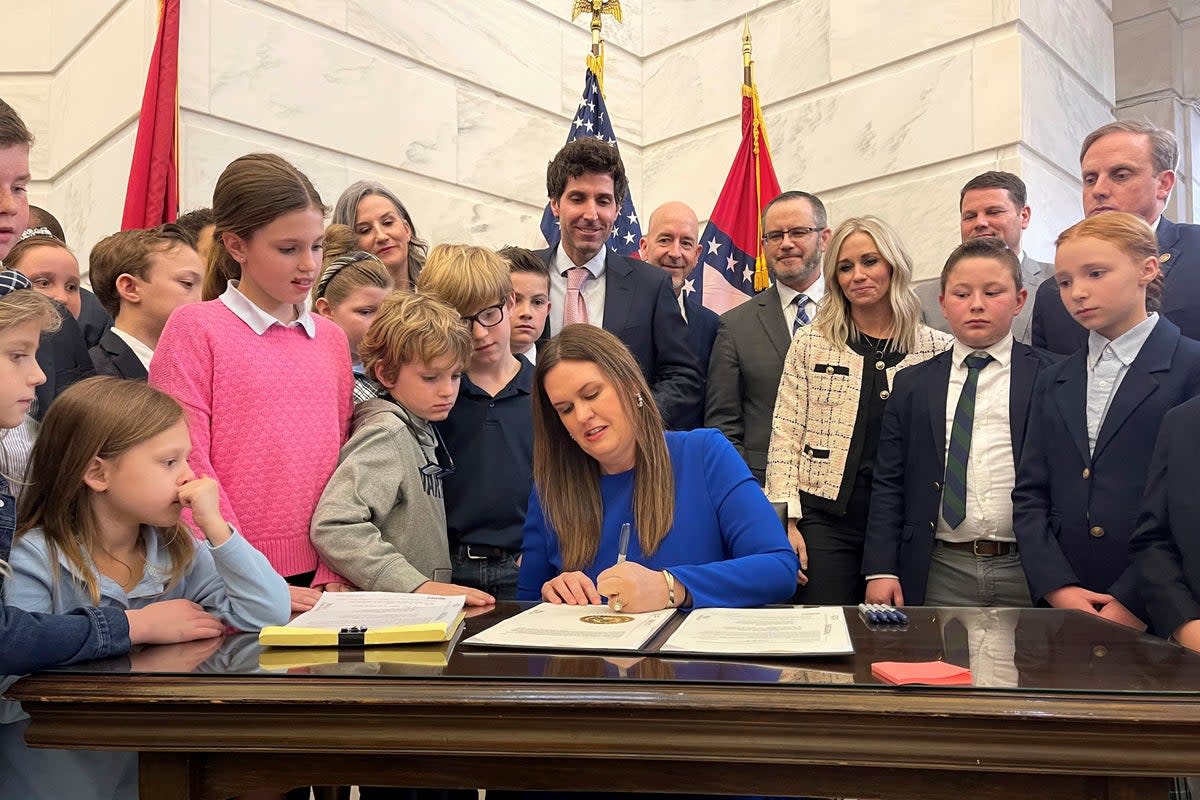Arkansas librarians are suing to block state law that threatens them with jailtime
A coalition of librarians, libraries, patrons, bookstores and publishers are suing officials in the state of Arkansas after passage of a sweeping state law that could threaten librarians with jail and heavy fines for materials in their collections.
Arkansas is among four states that have recently enacted state laws that make it easier to prosecute libraries, librarians and booksellers over explicit content, as Republican lawmakers and right-wing activists target LGBT+ content and descriptions of gender identity and sexuality in a nationwide campaign taking aim at materials in classrooms and on bookshelves.
Republican Governor Sarah Huckabee Sanders signed Act 372 into law earlier this year.
A federal lawsuit from several public library systems challenges the constitutionality of the law, which makes it a misdemeanor for children to access materials considered “harmful to minors,” a distinction that is overly broad and threatens First Amendment protections, plaintiffs argue.
The law “robs the state’s readers of their constitutional right to receive information and threatens the state’s booksellers and librarians with extreme punishments for performing their core – and essential – function of making books available to the public,” plaintiffs said in a statement on 2 June.
“This law will ultimately force bookstores and librarians to restrict their offerings to works that are suitable for minors, or bar them from entering institutions that have long served as the nexus between community and learning,” they added.
The lawsuit also argues that Arkansas law violates due process by allowing local officials to overrule decisions from libraries about book challenges without explanation or appeal.
Plaintiffs include the consortium of public libraries and librarians, including the Fayetteville Public Library, Eureka Springs Carnegie Public Library, Central Arkansas Library System and the Arkansas Library Association. Two local bookstores and several library patrons and advocacy groups have also joined the complaint.
Although Act 327 does not go into effect until 1 August, it already appears to be influencing decisions from local officials.
Books about LGBT+ people as well as disabled people, religion and puberty were moved from children’s sections in libraries in Crawford County, whose attorney argued that the law required them to do so, according to the lawsuit.
“I am representing the 28 prosecutors named in this lawsuit, and I look forward to defending the constitutionality of Act 372,” Arkansas Attorney General Tim Griffin said in a statement shared with The Independent.

Across the country, teachers and library workers have been thrust into a volatile political environment, facing on- and offline harassment while juggling new regulatory regimes and policies that could open them to costly litigation.
Such policies are running parallel with an unprecedented wave of state-level and national legislation targeting LGBT+ people, particularly trans youth, and attempts to limit honest discussion of race and racism in classrooms and workplaces.
Last month, free expression group PEN America and Penguin Random House, one of the world’s largest publishers, filed a similar federal lawsuit in Florida, where one county’s library system has faced nearly 200 book challenges and more than a dozen book removals.

There have been at least 1,477 attempts to ban 874 individual book titles within the first half of the 2022-2023 school year, according to PEN America. The figures mark a nearly 30 per cent spike from book challenges over the previous year.
More than 100 bills in state legislatures in at least 31 states this year threatened to cut library budgets, implement book rating systems, regulate the kinds of books and materials in their collections, and amend obscenity definitions that preempt First Amendment protections, according to a database from EveryLibrary.
At least 15 states considered legislation that would open up libraries and librarians to criminal prosecution.
Governors in Indiana and Montana as well as Arkansas signed such bills into law. Republican governors in Idaho and North Dakota vetoed similar legislation that passed through GOP-controlled legislatures.
